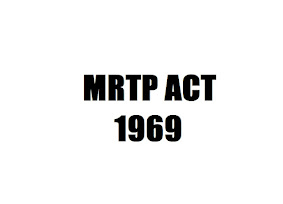What is MRTP Act: impact on Indian economy
India in the late 1960s, a time when economic growth was gaining momentum, but concerns lingered about fair competition and market dominance. Enter the Monopolies and Restrictive Trade Practices (MRTP) Act of 1969, a legislative gem crafted to ensure a level playing field for businesses and safeguard consumer interests.
The MRTP Act in a Nutshell:
Imagine the MRTP Act as a guardian angel for fair competition. Its primary goal? To prevent monopolies from emerging and to nip restrictive trade practices in the bud. This meant no more shady deals, price-fixing schemes, or underhanded tactics to stifle competition. The MRTP Act kept a close watch on mergers and acquisitions too, making sure they didn't tip the scales in favor of big players.
Impacts on India's Economic Fabric:
Fast forward a few decades, and the MRTP Act had left its mark on India's economic canvas:
1. Championing Competition: Thanks to the MRTP Act, businesses were encouraged to compete fairly. This fostered an environment where innovation thrived, quality soared, and consumers rejoiced in the abundance of choices.
2. Consumer Empowerment: With the MRTP Act in place, consumers were the real winners. No longer at the mercy of monopolistic giants, they enjoyed access to a diverse array of products and services at competitive prices, all while being shielded from exploitative practices.
3. Taming Economic Titans: The MRTP Act acted as a check on concentrated economic power. By curbing the dominance of a select few, it ensured that the benefits of economic growth were more evenly distributed, leveling the playing field for all.
4. Bumps in the Road: Yet, the journey wasn't without its bumps. Critics pointed out that the MRTP Act's regulatory machinery sometimes felt like navigating through a maze. Delays and red tape often hindered businesses, raising concerns about efficiency and agility.
5. Embracing Change: As the world evolved, so did India's approach to competition regulation. Recognizing the need for a more agile and responsive framework, the MRTP Act made way for the Competition Act of 2002, signaling a shift towards modernization and adaptability.
In Retrospect:
The MRTP Act may have faded into the annals of history, but its legacy lives on. It laid the groundwork for a fairer, more competitive economic landscape in India. As the country continues to evolve, the lessons learned from the MRTP Act serve as a reminder of the importance of balance, fairness, and adaptability in shaping the future of commerce and competition.

Comments
Post a Comment